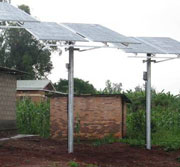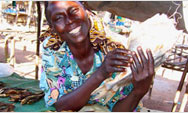Reliable Energy Enables Effective Response to HIV/AIDS in Rwanda
 |  |
Dependable access to efficient and affordable energy is essential to providing quality health care. |
 |
Dependable access to efficient and affordable energy is essential to providing quality health care. Without electricity health service provision is limited - facilities can only provide care and treatment during the day and providers cannot utilize the equipment essential for basic care.
Since the majority of Rwandans do not have access to health facilities with reliable electricity, this undermines the country's fight against HIV/AIDS and other critical threats to health.
USAID and the President's Emergency Plan for AIDS Relief (PEPFAR) have joined together to improve energy systems of rural health facilities in Rwanda to help enable effective prevention, care, and treatment of HIV/AIDS.
In Rwanda, the electricity grid only reaches approximately five percent of the population. Off-grid rural health clinics (and some district hospitals) must generate their own power using generators and solar electric systems. These systems are more expensive and complex to operate for the health facility. As a result, PEPFAR's implementing partners face considerable challenges trying to find sustainable ways to supply essential HIV/AIDS services. The equipment necessary to prevent new infections and provide care and treatment for those infected or affected by the disease - centrifuges, refrigerators, microscopes, etc. - all require electricity, placing a heavier burden on already overburdened energy systems.
Rather than each partner attempting to solve problems in a piecemeal fashion, USAID and the Centers for Disease Control and Prevention (CDC) in Rwanda are developing a consolidated national approach in order to assess the situation, develop guidelines to upgrade energy infrastructure in PEPFAR-supported facilities, train experts in the field, and ensure sustainability.
The initial assessment revealed that around 40 percent of energy systems in rural health facilities are not functioning properly, primarily due to poor system design and lack of maintenance. Clinics often have medical equipment that cannot be powered because the equipment draws too much power or is unsuited to the power supply.
With a lack of local private-sector capacity or in-house expertise in energy system design, partners have had few viable options to address these problems.
USAID has developed audit and design tools that can be used to evaluate PEPFAR-supported facilities. In August and September 2007, USAID trained eight energy experts (six from Rwanda, one from Uganda, and one from Kenya) to audit the energy systems of health facilities, recommend possible improvements, and prepare specifications for the necessary infrastructure. During the training, the needs of four health clinics were assessed, and detailed reports with recommendations were provided to the implementing partners.
"We can now assess the needs of the health facility more systematically," commented Jessica Price, the country director of USAID-partner Family Health International's program in Rwanda. "Instead of getting a few solar panels here and batteries there, we can contribute to the entire energy system which in turn will better and more efficiently serve the whole health facility. Approaching energy needs as a system will support the country's health objectives."
The trained experts will serve as a consulting core for the implementing partners. USAID will provide oversight and additional training to the experts in the short term, and also plans to develop guidelines and training for implementing partners on how to manage their energy use, and maintain the energy systems (especially solar systems) in their facilities.
The subsequent improvements in human capacity will not only power quality prevention, care and treatment of HIV/AIDS, but also improve the provision of all health services in all health facilities in Rwanda.
Back to Top ^
|


